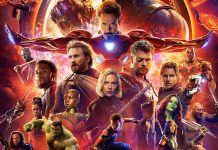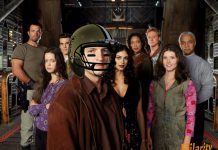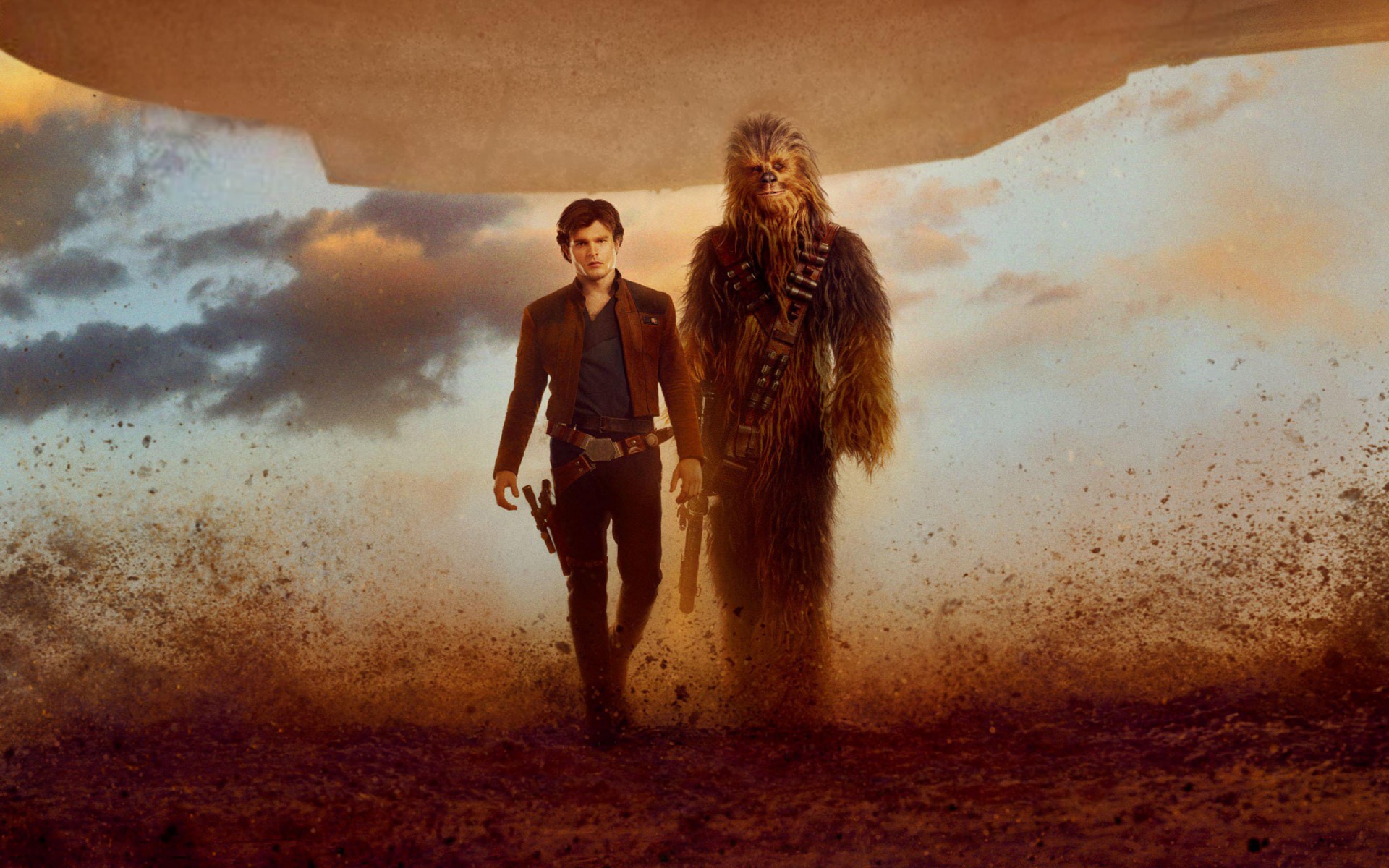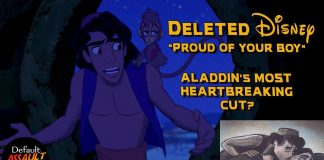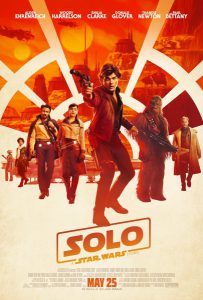 Solo is a rare title that perfectly clarifies expectation. It has to be asked: is Star Wars in danger of not being special anymore? A long time ago in cinemas not far, far down the road, the series ran at intervals of every three years with decades separating individual groupings. Since the Disney acquisition and the release of The Force Awakens in 2015, we are now treated to a new release every year with the Mouse charting a trail to infinity and beyond.
Solo is a rare title that perfectly clarifies expectation. It has to be asked: is Star Wars in danger of not being special anymore? A long time ago in cinemas not far, far down the road, the series ran at intervals of every three years with decades separating individual groupings. Since the Disney acquisition and the release of The Force Awakens in 2015, we are now treated to a new release every year with the Mouse charting a trail to infinity and beyond.
The market has already shown signs of over-saturation and the franchise’s core audience is defaulting to a lukewarm preconception with each new episode. This stringent adherence to meeting schedule demands has led to creative cataclysms behind the scenes, resulting in half of the new pictures suffering from unusual directorial scuffles and shuffles. Not to mention a general feeling of betrayal among many fans regarding the shoehorning of political ideals at the expense of character and storytelling. Worse still is when these very ideals are used as a shield against legitimate criticism, often leading to public rebuke and backlash aimed directly at the fanbase (a.k.a. the very people passionate enough to invest heavily in the product) from the production team themselves. With the release of Solo a mere five months after the contentious The Last Jedi, many are finding themselves at a previously unthinkable impasse: burned out and unenthusiastic.
This dispassion permeates the very core of Solo. The first Star Wars film to truly feel like it’s factory farmed, there is a sense of mediocrity that fills every frame in perfect concordance with the film’s grungy color pallet. It’s not a terrible film. In some ways, it’s actually a step up from Last Jedi – but it’s nothing special.
Years before we meet him in A New Hope, the film focuses on a young Han Solo (Alden Ehrenreich) – a destitute Corellian orphan that’s separated from his girlfriend (Emilia Clarke) during a daring escape from an oppressive syndicate. Following a three-year stint with the Empire, he uncovers an opportunity to reunite with his girl and become the best pilot in the galaxy by forging a fickle alliance with a group of criminals led by Woody Harrelson.
Along the way, we witness every bit of pre-established Solo backstory from the Original Trilogy: his acquisition of the Millennium Falcon from Lando Calrissian (Donald Glover); his meeting with Chewbacca (Joonas Suotamo); the infamous Kessel Run; the origin of his dice and blaster; his run in with Lando’s droid rights activist robot girlfriend L3-37 (Phoebe Waller-Bridge); his first face-to-face shower scene with Chewie—wait, scratch those last two (both from this list and your long-term memory). In many ways, Solo is the prologue of Indiana Jones and the Last Crusade stretched out artificially to feature length.
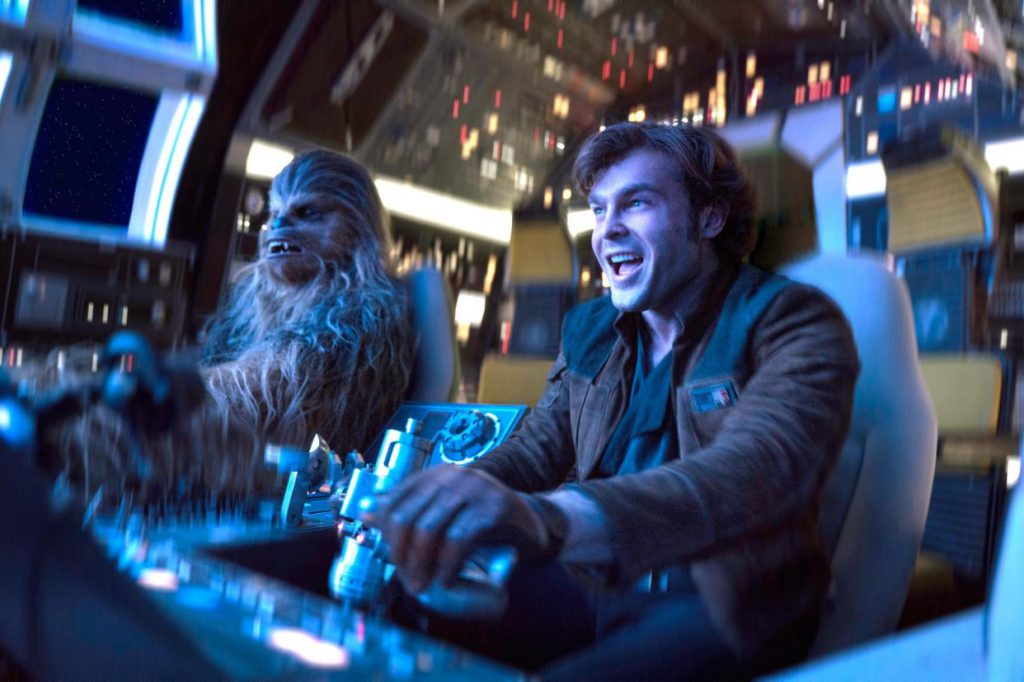
While many may blame Solo‘s failures as similar to those of the prequels, specifically the checklist predictability of established events, the story suffers in terms of execution. While the end result of the prequels was expectedly set in stone, they introduced enough new ideas and elements (for better or, mostly, worse) to justify their own identities. Solo, on the other hand, has a paint-by-numbers approach which robs it of most of its impact. With the exception of the Kessel Run sequence midway through (the only true highlight of the picture), Solo falls flat.
Speaking of flat, though Alden Ehrenreich turns in a better-than-reported performance, he lacks neither the charisma or presence to fill Harrison Ford’s captain’s chair. Much of the blame comes from the script itself, addling him with ham-fisted lines that would make Hayden Christensen ache in sympathy. This is all the more shocking considering that the great Lawrence Kasdan (Empire Strikes Back; Raiders of the Lost Ark) co-wrote the screenplay!
Emilia Clarke (Game of Thrones) falls in the same trap. She and Ehrenreich lack the necessary chemistry and gusto needed to cement the emotional center of the story (not to mention her sporting the most manicured hairstyle in the history of impoverishment). One scene where she confronts Solo about the goodness deep within him emotes as authentically as the cue cards they were written on. As for the obnoxious L3-37, her frequent onscreen outbursts and pandering wholly undercuts any substantive meaning she may have on the story. One scene in particular where she elaborates on human/droid sexual compatibility would seem out-of-place in the requisite porn parody let alone a Star Wars story.
Fairing better are Donald Glover and Woody Harrelson. Glover oozes enough charm to make up much of the deficit despite one biting, unearned scene that is hampered by the underdevelopment of others. The always reliable Harrelson turns in a workable baseline performance – basically a proto-Han Solo infused with a typical Woody flair.
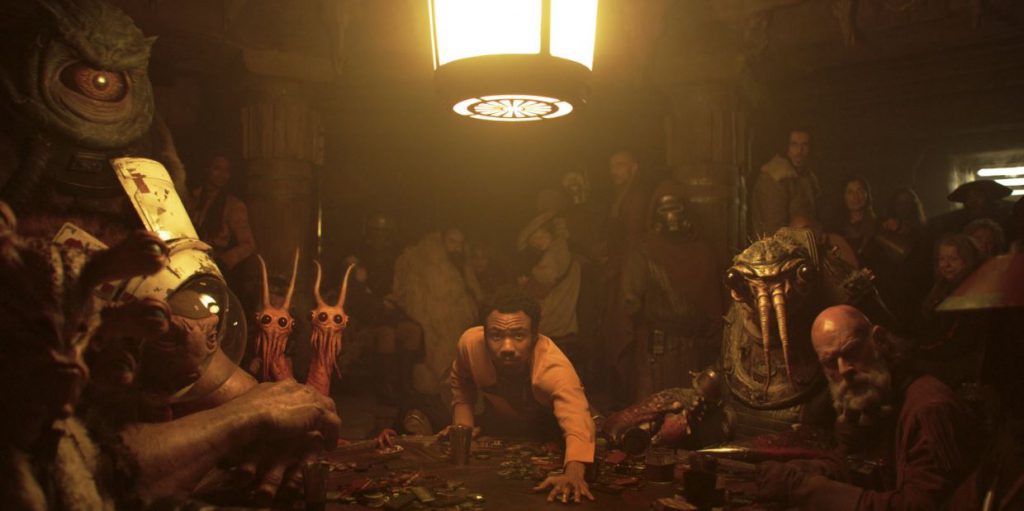
Perhaps the film’s most severe misstep is the characterization of the titular character (performance notwithstanding). There’s an inconsistent nature to Han here. One moment, he’s depicted as the arrogant badass inline with Ford’s take. The other, he’s a bumbling, idealistic youth suffering belittlement by all around (you’d think that after three years on battlefield, he would have hardened just a little). To say that this is the natural development of his character from altruism to pessimism is astigmatic – this is a bipolar take upon delivery, with the character achieving the endgame of his original trilogy arc within this very film. To use the excuse that it’ll all be explained in a subsequent, unannounced sequel is a poor one. This franchise has burned that argument before (plus, Solo 2 would be the oxymoron epitome of the motion picture industry).
Despite its many flaws, there are some fun moments to be had that salvage Solo from being a complete waste. Solo‘s introductory escape from Corellia hinges upon some clever moments and the aforementioned Kessel Run lives up to its reputation (despite its over-reliance on nostalgic John Williams themes to elevate engagement).
Ultimately, Solo may not be the nail-in-the-coffin to the new string of Star Wars films as many have espoused (that verdict may rest with Episode IX); yet, it has achieved a disappointing new degree. It’s the first film in the saga that would be served best by a casual video rental or Netflix play – and that’s truly not very special.




